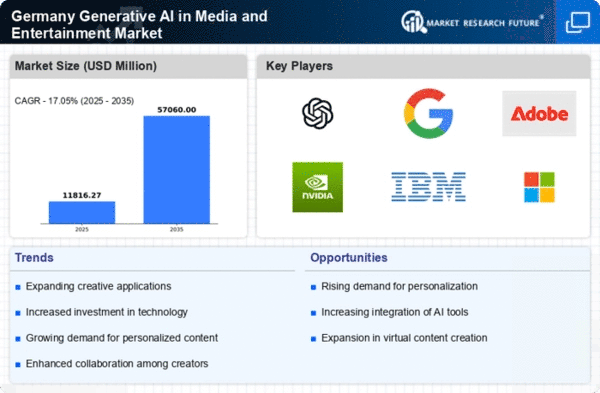Technological Advancements in AI
The rapid evolution of artificial intelligence technologies is a primary driver for the generative ai-in-media-and-entertainment market. In Germany, advancements in machine learning and natural language processing are enabling creators to produce high-quality content more efficiently. For instance, AI algorithms can now generate scripts, music, and visual art, significantly reducing production time and costs. The market is projected to grow at a CAGR of 25% from 2025 to 2030, indicating a robust demand for AI-driven solutions. As companies increasingly adopt these technologies, the generative ai-in-media-and-entertainment market is likely to witness a surge in innovative applications, enhancing the overall creative process.
Investment in Creative AI Startups
The influx of venture capital into creative AI startups is significantly impacting the generative ai-in-media-and-entertainment market. In Germany, investors are recognizing the potential of AI technologies to revolutionize content creation and distribution. Reports indicate that funding for AI-driven media companies has increased by over 40% in the past year, highlighting a strong belief in the market's future. This financial support enables startups to develop cutting-edge tools and platforms that enhance creative workflows. As these innovations emerge, they are likely to reshape the landscape of the generative ai-in-media-and-entertainment market, fostering a competitive environment that encourages further advancements.
Consumer Demand for Interactive Experiences
There is a growing consumer appetite for interactive and immersive media experiences, which is driving the generative ai-in-media-and-entertainment market in Germany. Audiences are increasingly seeking personalized content that engages them on a deeper level. This trend is reflected in the rising popularity of video games and virtual reality experiences that utilize generative AI to create dynamic environments and narratives. According to recent surveys, approximately 60% of German consumers express interest in AI-generated content that adapts to their preferences. This shift in consumer behavior suggests that companies must innovate to meet these expectations, thereby propelling the market forward.
Regulatory Frameworks Supporting Innovation
The establishment of supportive regulatory frameworks in Germany is fostering growth in the generative ai-in-media-and-entertainment market. Policymakers are increasingly recognizing the importance of AI in creative industries and are working to create guidelines that encourage innovation while addressing ethical concerns. For example, initiatives aimed at protecting intellectual property rights for AI-generated content are being developed. This regulatory clarity is likely to attract more investments and partnerships within the industry, as companies feel more secure in their ability to operate within a defined legal landscape. Consequently, this supportive environment may accelerate the adoption of generative AI technologies in media and entertainment.
Collaboration Between Tech and Creative Industries
The collaboration between technology firms and creative industries is emerging as a vital driver for the generative ai-in-media-and-entertainment market. In Germany, partnerships between AI developers and content creators are becoming increasingly common, leading to innovative projects that leverage the strengths of both sectors. These collaborations often result in the development of unique tools that enhance storytelling and artistic expression. For instance, joint ventures have produced AI-driven platforms that assist filmmakers in visual effects and animation. This synergy not only enriches the creative process but also expands the market's potential, as new applications of generative AI continue to be explored.






















Leave a Comment